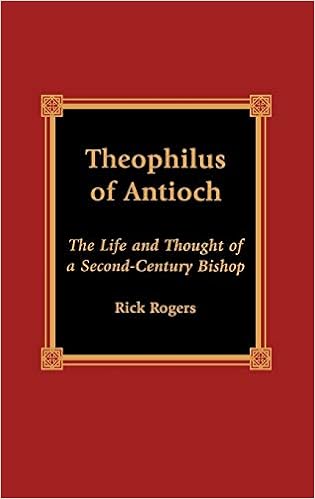We don't know much about Theophilus as it turns out, and Rogers's book doesn't tell readers much more as a result. Although the book's subtitle promises “a life,” we get few details of that. What we know of Theophilus mostly comes from his three-volume work, To Autolycus, and it is that which Rogers spends most of his book recounting—quoting passages from it, and then explaining what those passages mean. I didn't feel like I gained much from the work's first two-thirds. It's been a while since I read Theophilus's work, so the summary was useful, but a rereading of his volumes would have served much the same value. I was hoping for more background, more cultural insight. Most of what we get in that regard is Rogers's breakdown of the volumes into three kinds of works, explaining how to see the work as an apology, as it is usually read, is perhaps not quite as useful as seeing it as also a teaching work.
Where the book grows most useful is in its final third, where Rogers does his true analysis of the subject. Here, he plays off the work of R. M. Grant, whose work he also summarizes. Grant's thesis on Theophilus largely claims that the man was a low-Christology adoptionist (one who believed that Jesus has no prebirth divinity and who was “adopted” as divine at the start of his physical life) of a Jewish stamp (much like the Ebionites). Rogers critiques this view, arguing that although Theophilus claims to be a Christian yet talks very little about Christ in his work, the work was largely intended for a particular purpose that did not require extensive discussion about Christ's role (indeed, such discussion may have turned off his intended pagan audience). As such, it's difficult to assess Theophilus's view of Christ.
That Theophilus was viewed favorably by later early writers such as Eusebius and Jerome, however, suggests to Rogers that he was “orthodox enough” and that his view of Christ may well have been more line with thinkers like Ignatius and Ireneaus. Indeed, Rogers points out, Theophilus's heavy emphasis on law keeping would seem to suggest a closer tie to emphases that the writer James makes in his New Testament letter rather than views outside the pale. (Rogers sees James and Paul not so much as opposites—Paul had his own way of emphasizing the efficacy of the law—but as writers who emphasized different aspects of faith.) Theophilus talks little of the death of Jesus allowing the forgiveness of human sin (indeed, doesn't really mention it), instead emphasizing, like James, that Christian faith (and the salvation that comes with it) demands an adherence to high ethical standards set forth in Scripture. Such emphasis would have played well to Theophilus's purpose of attempting to win interest from a non-Christian, who would have been more drawn to the ethical dimensions of Christianity than to the theological ones.







No comments:
Post a Comment